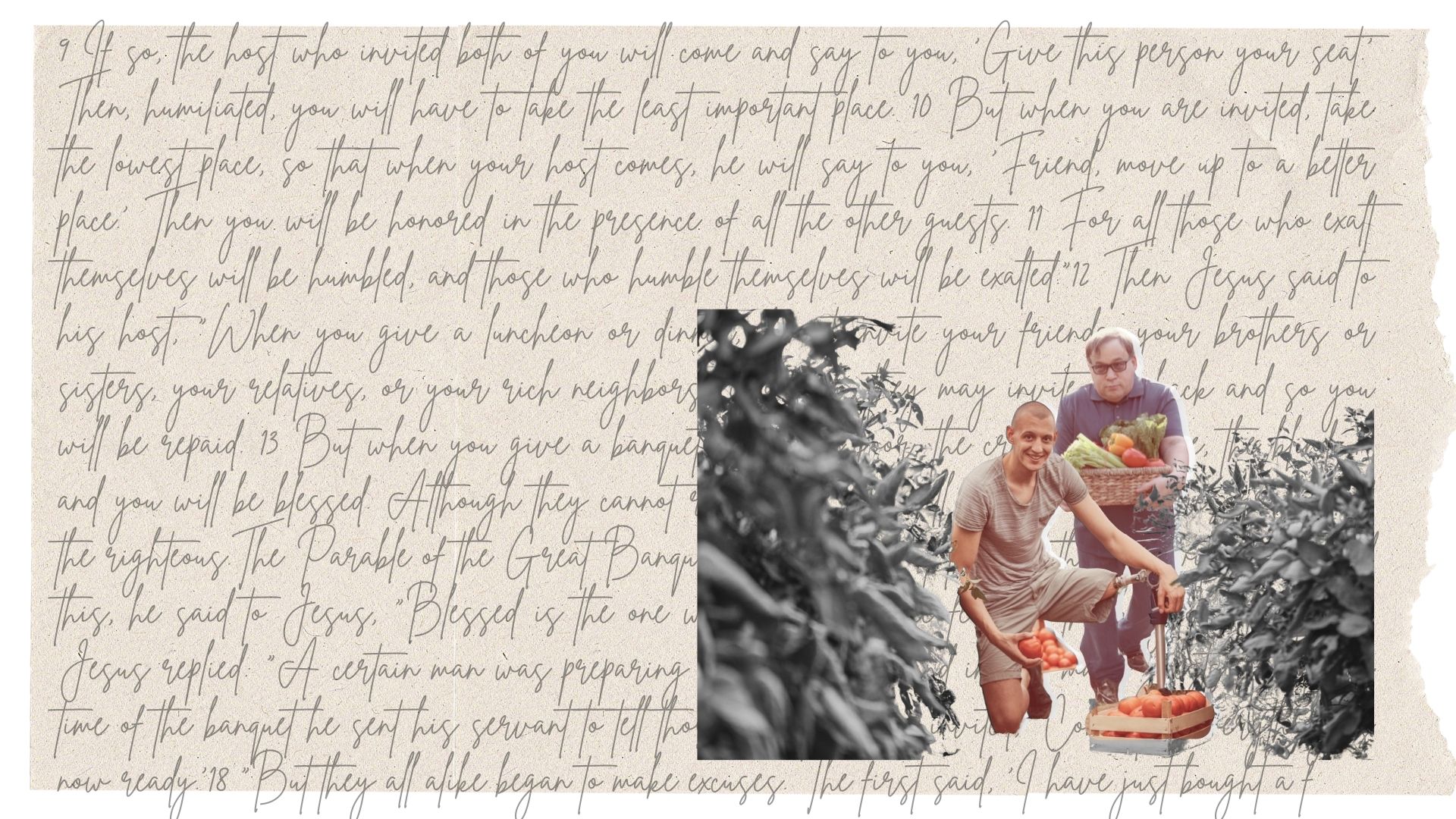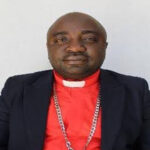Editor's Note
This article is based on the author’s presentation (19:22 Daniel’s Story: Disability and Reconciliation in the DRC) at the Fourth Lausanne Congress.
Our Lord Jesus Christ tells us, ‘When you give a banquet, invite the poor, the crippled, the lame, the blind, and you will be blessed’ (Luke 14:13-14).1
According to the World Health Organization report,2 people with disabilities represent 15 percent of the world’s population, the majority of whom live in developing countries. Despite their high number, people with disabilities participate poorly in social life, including in Christian activities. It is not only rare to find people with disabilities among members of a local church or in Christian organizations, but also and especially among leaders. This means that the place that the church reserves for people with disabilities resembles that which the world reserves for them. Yet, Jesus Christ invites us all, without exception, to take part in his banquet (Matthew 22:9) and in the Great Commission (Matthew 28:19).
It is not only rare to find people with disabilities among members of a local church or in Christian organizations, but also and especially among leaders. This means that the place that the church reserves for people with disabilities resembles that which the world reserves for them.
Regardless, efforts to increase the inclusion of people with disabilities in Christian activities depend on one’s perspective on disability. Research shows that low participation of people with disabilities in social life is due to both social barriers—such as stigma, discrimination—as well as environmental, physical, and organizational barriers. Overcoming these and other barriers requires that we change our attitudes towards people with disabilities and that we introduce reasonable accommodations in the physical and organizational environment.
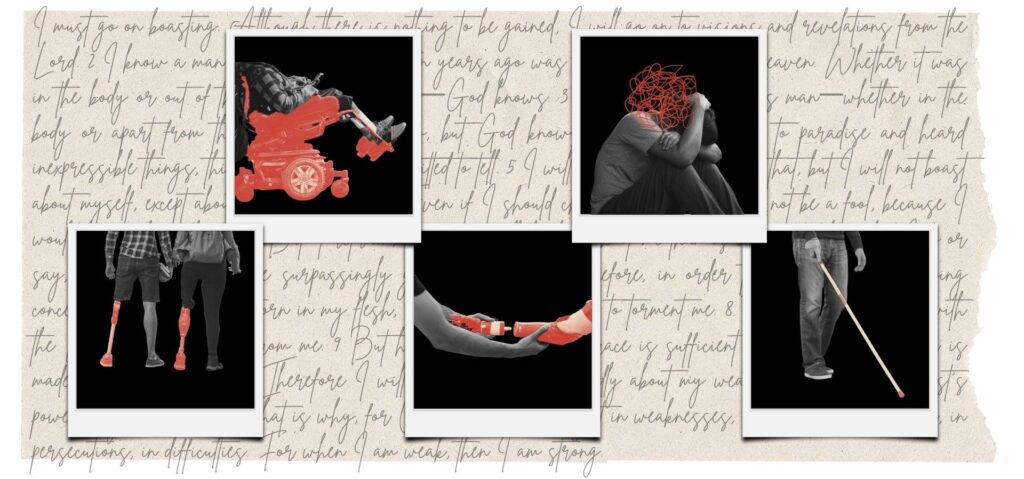
The World’s Perspective on Disability
The world sees the cost to improve our attitudes towards people with disabilities and to implement reasonable accommodations as greater than the expected gain due to the socio-professional inclusion of people with disabilities. This is in line with the perspective theory which shows that interactions between society and people with disabilities are of poor quality since society considers this category of people as having nothing to give. This leads to inaction, when in reality, the cost of changing our attitude towards people with disabilities is nothing. Society’s expectations from people with disabilities are low, and this leads to their exclusion. This low level of expectations does not reflect the reality of the level of real usefulness of people with disabilities. Research shows that in some circumstances, the skills of people with disabilities can match or exceed those of people without disabilities. However, the skills of people with disabilities are often obstructed by the prejudices and stigmatization they suffer.
For most governments who want to increase the participation of people with disabilities, the solution involves legal enactment or financial incentives. The laws could require or encourage actors to include people with disabilities. However, history tells us that these measures taken by world leaders are often not out of love towards people with disabilities. These constraints or incentive measures are the response to the pressure due to the demands of people with disabilities themselves, which began in the United States around the 1970s. When people with disabilities remain silent, nothing gets done for them.
The Church’s Responsibility
If Christian leaders adopt the world’s perspective on disability, little will be done to enable people with disabilities to take part in the Lord’s banquet and to participate fully in God’s mission on earth. The church has the responsibility to show the model of reconciliation and inclusion of people with disabilities and not the opposite. We are the salt and light of the world.
As Christian leaders, should we allow ourselves to be influenced by the world’s perspective or should we embrace God’s perspective on disability?
God embraces the vulnerable and does not reject them
If God had considered vulnerability a threat, you and I would not be his children and co-heirs with Christ. It is in our weakness that the Lord sought us to give us the status of children of God (Rom 5:6-8). The Lord also beseeches us to invite others with disabilities (Luke 14:13).
God sees vulnerability as an opportunity to display his glory
Let us remember the words of the Apostle Paul: ‘And he said to me: My grace is sufficient for you, for my power is made perfect in weakness’ (2 Cor 12:9).
Performance in Christian ministry does not depend on our physical, intellectual, or financial assets
It is Jesus Christ who makes us bear fruit that remains (John 15:4). It is through the Holy Spirit that we can perform his mission (Zech 4:6). He can also powerfully use people with disabilities to carry out his mission on earth, thanks to their call and the spiritual gifts he grants them.
If Christian leaders do not embrace those with disabilities, they are moving away from God’s perspective on disability and vulnerability, which is what the statistics show.
Reflection
- What is your attitude as a Christian leader towards what is or appears to be weak, vulnerable?
- How have you resolved to treat the marginalized, the weak, the vulnerable, and the poor within your area of responsibility or influence?
- Does the place we reserve for people with disabilities, the poor, and the marginalized in our institutions reflect the quality of our agape love?
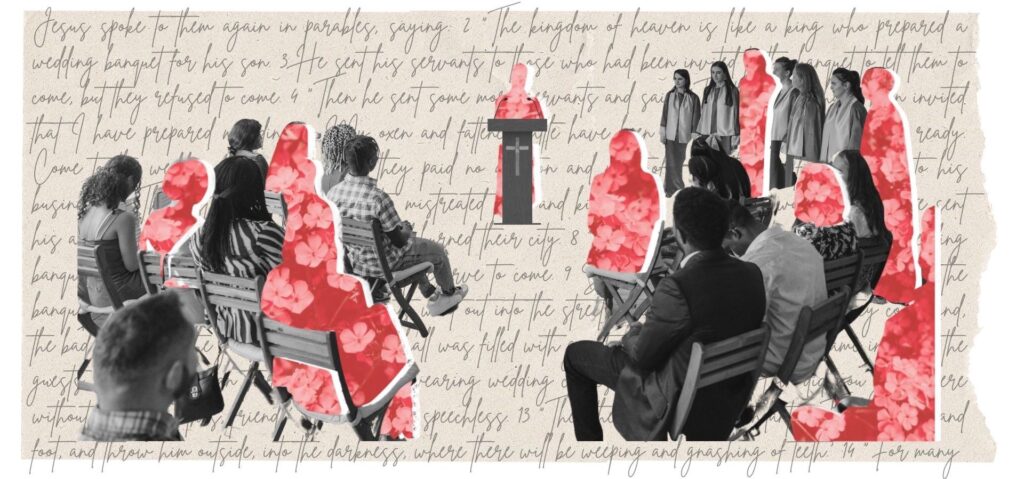
Perspectives on Inclusion of People with Disabilities
There are two perspectives to adopt when we want to carry out actions in favor of the inclusion of people with disabilities: the normative perspective and the analytical perspective.
The normative perspective consists of referring to good practices suggested by experts and implementing them in one’s own institution as minor adjustments. This approach has advantages and disadvantages.
Advantages
- Good practices often come from experts and have already proven themselves elsewhere;
- They reduce the cost of research;
- They can be implemented quickly.
Disadvantages
- Sometimes they can be disconnected from contextual reality;
- Poor understanding, appropriation, and involvement of local actors, claiming that these are injunctions coming from elsewhere;
- Low involvement of disabled people.
The analytical perspective involves understanding contextual situations and developing contextual solutions with the participation of beneficiaries. This perspective allows for strong ownership of the solutions developed by the stakeholders, because they consider that they come from themselves and best integrate their concerns. However, setting them up may require more time, in addition to the cost of research and inexperience.
The answer to the question of what the church can do to include people with disabilities also involves positioning itself in relation to the sector of intervention. Will the intervention focus only on spiritual aspects or concern the other challenges facing this category? For example, lack of access to employment, education, justice, transport, etc.3 In high-income settings individuals supported by the government system tend to have access to the necessary aids.4 However, previous studies show that in developing countries, where the majority of people with disabilities live, it is generally the family that takes care of people with disabilities. How does the church intend to position itself regarding this question? In the opinion of experts, supporting people with disabilities requires a holistic approach, with several skills to mobilize. The church can become a place of refuge for people with disabilities, and lives will be touched by the love of Christ.
The church can become a place of refuge for people with disabilities, and lives will be touched by the love of Christ.
By adopting the normative perspective, we can classify good practices to be carried out according to the WHO biopsychosocial model5 and the IOS6 model into actions on the individual, the organization, and society.
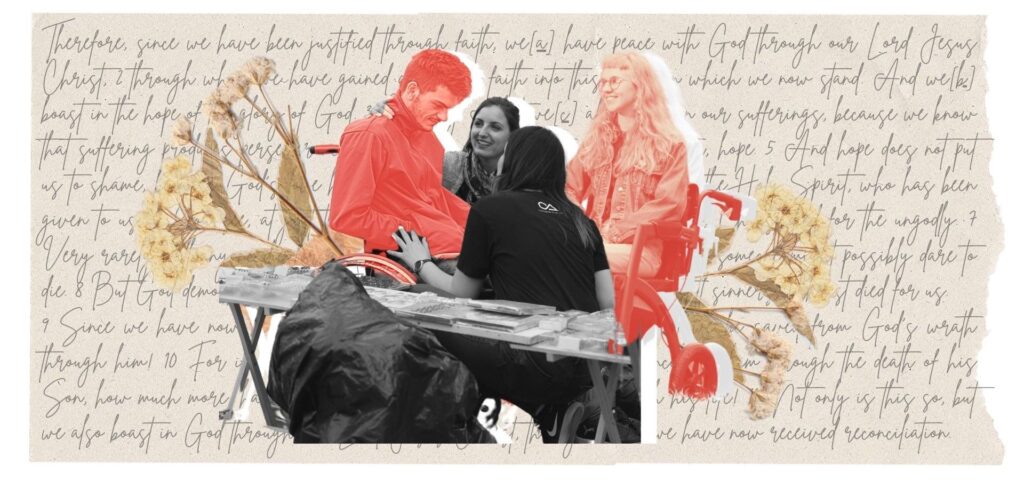
Recommended Actions
We suggest the following actions at the individual, organizational, and societal levels:
- Embrace God’s perspective by considering people with disabilities as co-workers and co-beneficiaries of the same grace as people without disabilities.
- Equip yourself with agape love to move towards people with disabilities and bring them out of isolation, far from the kingdom of God. Invite them to take part in the Lord’s banquet through the gospel message.
- Seek out people with disabilities to understand them. Thanks to qualitative research methods, we can co-construct solutions with them for their integration into Christian activities.
- With humility, let their life experience instruct you instead of always avoiding them.
- Be wary of prejudices and watch for the gifts that the Lord can grant to people with disabilities through the Holy Spirit.
- Train church members and leaders for ministry to and by people with disabilities. The church should also consider how they can equip and train those with a disability to minister in various areas. This might, for instance, mean considering how the church can support their access to Bible training programs and Bible colleges.7
- Dave Deuel suggests that we must take the church—the body of Christ with all its spiritual engagement and blessings—to people with disabilities who cannot come to church.8
- Highlight the role that people with disabilities can play in comforting church members who are suffering and whose hearts are broken.
- Developing leaders with disabilities is a sustainable and biblical multiplication strategy.9
- Raise awareness against self-censorship by formally and joyfully inviting them to participate in the banquet. For example, by inviting him or her for a meal or to watch a football match together, as was my case in Los Angeles, California. Reaching out to people with disabilities who live in isolation can have an emotional impact on self-censorship.
- If the disabled person needs adapted equipment to move around or carry out the activity you are offering them, make it available to them.
- Invite the person to church and ask questions about how you and your congregation could make their visit a positive experience.
May God’s love, through the work of the Holy Spirit, allow us to accept his perspective on disability and weakness, and help us move forward towards people with disabilities, to give them access to the Lord’s banquet. They are also invited. And let’s include them in his mission to the ends of the earth.
Endnotes
- Editor’s Note: This article is based on the author’s presentation at the Fourth Lausanne Congress.
- ‘World Report on Disability 2011’, World Health Organization, accessed 8 October 2024, https://www.who.int/teams/noncommunicable-diseases/sensory-functions-disability-and-rehabilitation/world-report-on-disability.
- ‘Driving down the Extra Costs Disabled People Face: Final Report’, Extra Costs Commission, accessed 8 October 2024, https://assets-eu-01.kc-usercontent.com/73ea709e-f9f8-0168-3842-ebd7ad1e23ac/ca5ea908-a558-4aae-9e9d-d07990ee08c7/2015%20Extra%20Costs%20final%20report.pdf%23search%3Dextra%20costs%20commission.pdf.
- ‘Ministries of People with Disabilities: ‘All in’, Lausanne Occasional Paper, https://lausanne.org/occasional-paper/disability-concerns-lop-69.
- Organisation Mondiale de la Santé and Banque Mondiale, ‘Rapport Mondial Sur Le Handicap’, (Geneva, 2012),
- Daniel Kyungu, ‘Insertion Socioprofessionnelle Des Personnes En Situation de Handicap: Diagnostic et Pistes d’action’ (translated into English by author: ‘Socio-professional integration of people with disabilities: diagnosis and courses of action’), (Université de Liège, 2022),
- ‘Ministries of People with Disabilities: ‘All in’,’ Lausanne Occasional Paper.
- Dave Deuel, ‘Taking Church to People with Disabilities,’ in Lausanne Global Analysis, March 2023,
- Dave Deuel, ‘Developing Young Leaders with Disabilities,’ in Lausanne Global Analysis, January 2016,
